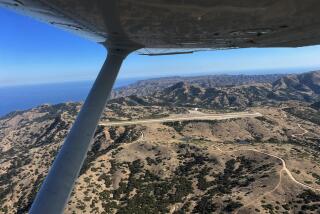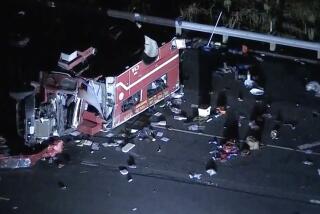After Conception burned, police divers rushed to help. Hazards and stress awaited

When calls went out for police divers on Labor Day morning, law enforcement teams hurried to Santa Barbara. They rushed to tackle the daunting task of locating 34 people who had been trapped below deck when the Conception dive boat, anchored off Santa Cruz Island, caught fire.
Since last Monday, Santa Barbara County Sheriff Bill Brown has praised the dive teams that have responded from across Southern California.
âThese divers are professional,â said Lt. Tim Kalkus, the leader of the Los Angeles Police Departmentâs Underwater Dive Unit. But, he added, âI donât think there is anything that can prepare them to deal with this.â
Divers from the FBI, Long Beach police, San Luis Obispo sheriffâs office and other law enforcement agencies worked last week to recover the sole victim still missing.
The Coast Guard suspended search efforts on Friday because high winds posed dangers to divers and salvage operators.
Kalkus called law enforcement divers a âvery rare commodityâ among police organizations.
The LAPD dive team, which is part of the elite Metropolitan Division, provided security as well as divers who stood by in case of emergency, though none went underwater in the recovery operation for the Conception.
Kalkus did not address the Conception operation specifically but spoke of the dangers police divers faced when submerging to search for victims.
âItâs a very technical operation,â said Kalkus, who has been on the LAPD dive team for 18 years. âItâs a difficult job.â
Officer Steve Gordon, who spent more than 10 years on the LAPD dive team, said divers knew the enormity of the task needed to recover 34 victims in 60 to 65 feet of water.
âThe gravity of the situation weighs heavily on their shoulders,â said Gordon, a director at the Los Angeles Police Protective League. âThese divers are humane and professional. This isnât normal recreational diving.â
Investigating tragedies underwater is the same as investigating mass deaths in buildings or on roadways, both men said.
Divers use tennis balls and weights to mark evidence underwater like detectives use numbered markers on the street. Divers also establish grid patterns to scour the ocean floor for evidence.
But underwater operations pose other dangers. Sharp edges from twisted wood and steel on boats, along with tangled wires and leaking fuels, are hazards that could injure divers. Thereâs also debris on the surface, underwater and on the ocean floor.
In this operation, the first divers may have gone underwater to film the wreck, Gordon said, so others could know the possible dangers that awaited.
âThere are so many things to be concerned about,â said Gordon, who visited a makeshift memorial at the Santa Barbara Harbor to pay his respects. âYouâre going into a different atmosphere.â
Wearing equipment and air tanks weighing 40 to 80 pounds, divers locate and photograph evidence underwater. Once divers find bodies, they place them in body bags below the surface to make sure evidence does not become contaminated.
âExtremeâ care is taken to show victims âthe respect that they deserve,â Kalkus said. âWe go out of our way. The families deserve that.â
Every police diver deals differently with the emotions of recovering bodies underwater, Kalkus said. He says itâs important for dive leaders to make sure stress is not affecting team members.
At times, he has kept some divers from going underwater, until heâs sure they can handle the mission. Some divers deal with stress by talking about the operation, he said, and others are more emotional in expressing their feelings.
âI look my divers in the eye and talk to them,â Kalkus said.
Gordon said in the Conception operation, police supervisors may have rotated divers to minimize the stress from the horrors they had to witness. Cops are human â no matter how tough they act, he said.
It could take these divers years to recover, Gordon noted. âItâs possible it will play over and over in their heads.â
More to Read
Sign up for Essential California
The most important California stories and recommendations in your inbox every morning.
You may occasionally receive promotional content from the Los Angeles Times.











